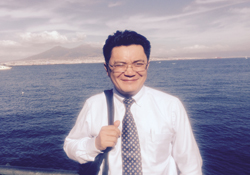Educating health workers and patients in Kazakhstan about antibiotic resistance

WHO
Dr Bekturgan Karin is head of the neonatology unit at the National Research Centre for Maternal and Child Health in Astana, Kazakhstan. He has worked as a neonatologist since 2000. Over the course of his career he has treated patients with hospital-acquired infections, including some antibiotic-resistant infections. Here, he shares his views on the importance of educating doctors and patients about using antibiotics carefully and wisely.
What kinds of issues related to antibiotic resistance do you experience in your work? How have you tried to address them?
I can’t say precisely how often we experience antibiotic-resistant infections at my workplace, but uncontrolled antibiotic therapy is an issue. Unfortunately, doctors often want to get a positive result from treatment as quickly as possible, so they begin to prescribe new antibiotics, change the prescription, etc.
In order to address these issues, we invited a WHO expert to carry out a training course for my team on this topic. We have now revised our procedures and appointed people responsible for overseeing antibiotic stewardship, to help make sure that we approach antibiotic therapy in a controlled manner. We need to teach doctors to think about the consequences and complications that arise from uncontrolled antibiotic therapy. Changes in antibiotic therapy should be discussed with the department head and hospital epidemiologist, to ensure it is the right course of action.
What steps do you think should be taken to help stop the spread of antibiotic resistance?
As doctors, we need to remind ourselves of the principle of “primum non nocere” – first, do no harm. We need to prescribe and administer antibiotics in a way that doesn’t harm our patients or the community. We need to conduct a massive information campaign to help both health workers and patients understand the importance of using antibiotics carefully.



